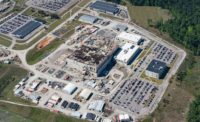With the backing of a pronuclear administration, DOE is trying to step up activities to put the industry in a position to construct new powerplants. But DOE is looking for commitments from the industry before making steep investments. "This administration has been clearit would like to see more nuclear power," William Magwood IV, director of DOE's nuclear energy program, told an industry conference July 23. Speaking at the Nuclear Energy Institute's Fuel Supply Forum, Magwood said DOE's Nuclear Power 2010 initiative is the centerpiece of the administration's plan to help bring new nuclear technologies to the marketplace by the end of the decade.
DOE provided funding to two utilities for scoping work on the potential for federal sites to host new plants. Exelon was awarded $217,000 for scoping at one site, and Dominion was given $330,000 to study three sites, said DOE spokeswoman Hope Williams. Neither DOE nor the utilities have said which companies are exploring which sites. The initial estimate for the work had been $700,000, but in the end, DOE awarded $547,000 for the project. Three of the four sites under review were the Savannah River Site in South Carolina, Idaho National Engineering & Environmental Laboratory, and the Portsmouth gaseous diffusion plant site in Ohio.
As part of the 2010 initiative, DOE selected Dominion, Entergy, and Exelon for a $17-million cost-sharing project to demonstrate NRC's early site permit process. The money will be distributed over four years and each utility will have to contribute at least half the costs. Magwood said other utilities also have approached DOE about exploring sites but did not disclose which utilities have expressed an interest. Magwood told Nucleonics Week that DOE is in talks with the industry about cost-sharing options. He said DOE wants utilities to make the business decisions about new construction and implied that required some investment in the technologies on their part.
He told the conference that the biggest challenge to new construction is the economics, and to date, utilities haven't seen a workable deal. He said utilities are spending "time and resources" to assess various proposals, but that the economics are not yet there.


Post a comment to this article
Report Abusive Comment